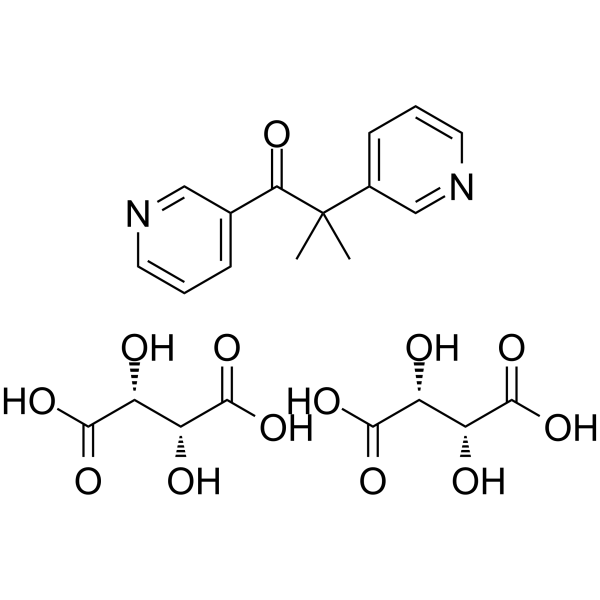908-35-0
| Name | Metyrapone tartrate |
|---|---|
| Synonyms |
Metopirone ditartrate
Butanedioic acid, 2,3-dihydroxy-, (2R,3R)-, compd. with 2-methyl-1,2-di-3-pyridinyl-1-propanone (1:1) 2-Methyl-1,2-di-3-pyridinyl-1-propanone (R-(R*,R*))-2,3-Dihydroxybutanedioate (1:2) (2R,3R)-2,3-Dihydroxysuccinic acid - 2-methyl-1,2-di(3-pyridinyl)-1-propanone (1:1) Metyrapone tartrate |
| Description | Metyrapone (Su-4885) Tartrate is a potent and orally active 11β-hydroxylase inhibitor and an autophagy activator, also inhibits the production of aldosterone. Metyrapone Tartrate inhibits synthesis of endogenous adrenal corticosteroid, decreases glucocorticoid levels, and also affects behavior and emotion. In addition, Metyrapone Tartrate increases the efficiency of autophagic process via downregulation of mTOR pathway, and interacts with Pseudomonas putida cytochrome P-450. Metyrapone Tartrate can be used for researching Cushing's syndrome and depression[1][2][3][4][5]. |
|---|---|
| Related Catalog | |
| Target |
11β-hydroxylase, Aldosterone, CYP450, Autophagy[1][4][5] |
| In Vitro | Metyrapone (100 μM; 2 h) hyperactivates autophagy in HepG2, and delays the activation of apoptosis at severe endoplasmic reticulum (ER) stress[5]. |
| In Vivo | Metyrapone (25 or 50 mg/kg; SC, single dosage) decreases the stress-induced increase in plasma corticosterone levels, significantly impairs acquisition performance at high dosage, and increases open arm activity at low dosage[1]. Animal Model: Male Sprague-Dawley rats (n=179; 270-300g)[1] Dosage: 25 or 50 mg/kg (in a volume of 2.0 ml/kg) Administration: SC, single dosage Result: Dose-dependently decreased the stress-induced increase in plasma corticosterone levels in the water maze test; the high level dose significantly impaired acquisition performance in the water maze and decreased fear-induced immobility; the lower dose increased open arm activity. |
| References |
| Molecular Formula | C18H20N2O7 |
|---|---|
| Molecular Weight | 376.361 |
| Exact Mass | 376.127045 |
